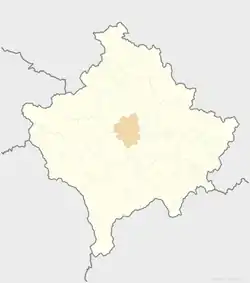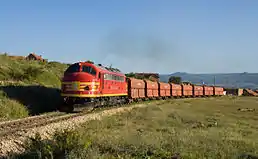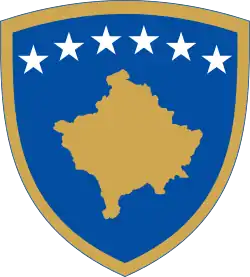Drenas
Drenas (also known as Gllogoc in Albanian or Serbian: Глоговац), is a town and municipality located in the Pristina District in central Kosovo.[lower-alpha 1] According to the 2011 census, the town of Drenas had 6,143 inhabitants, while the municipality had 58,531 inhabitants.
Drenas | |
|---|---|
Town and municipality | |
| Albanian: Drenas Serbian: Глоговац/Glogovac | |
 Emblem | |
 Location of the municipality of Drenas within Kosovo | |
| Coordinates: 42°37′N 20°54′E | |
| Country | Kosovo[lower-alpha 1] |
| District | District of Pristina |
| Government | |
| • Mayor | Ramiz Lladrovci PDK |
| Population (2011) | |
| • Urban | 6,143 |
| • Municipal | 58,531 |
| Time zone | UTC+1 (CET) |
| • Summer (DST) | UTC+2 (CEST) |
| Postal code | 13000 |
| Area code(s) | +383 38 |
| Car plates | 01 |
| Website | kk |
Geography and population
Glogovac municipality is located in central Kosovo, between the Čičavica mountains in the east and the Drenica hills in the north and west. The main road from Pristina to Peja crosses the municipality.
At a junction at Komorani village, a smaller road extends north from the highway, passing through Glogovac town and continuing to Skenderaj. There are a total of 36 villages in the municipality, including the town of Glogovac. The municipality's population prior to the 1999 bombing was approximately 58,579 made up almost entirely of Albanians, with a small number of Serbs and others only in the Glogovac town. No minorities remained in the municipality, thus Glogovac today reflects a mono-ethnic environment.
History

The municipality of Glogovac was established before World War II. During Yugoslavia economic growth was low. Lately, there has been a gradual improvement in economic, agricultural, educational, medical and industrial growth. Municipal development has affected the construction of network-educational system, health and service network intensifying agricultural development has become especially after the construction of the irrigation system "Iber Lepenci", while a positive movement for the economy of Glogovac is marked by complex building "Ferronikeli".
Prior and during the Kosovo War (1998–99), the ethnic Albanian separatist Kosovo Liberation Army (KLA) had a strong level of influence and during the war controlled large areas of the municipality. Drenica, including the Glogovac municipality was consequently badly affected. During the war, there were instances of massacres carried out by Yugoslav forces. Mass graves were later exhumed in an attempt to conceal crimes.[1][2]
Services, media and organizations
Internet services
The strongest local Internet providing company at the area at the time is Kujtesa. Other companies like Sky Net and Galaktika were established after the war at 2002 and are some of leading companies at the region.
Local and international NGOs
The presence of the international non-governmental organizations (NGOs) in the municipality remains unchanged. The number of international NGOs is reduced, while their activity level can be described as modest. Only the International Committee of Red Cross (ICRC) continues to be based in Glogovac while the few other international NGOs working in Glogovac are mainly based in Pristina. These include Swiss CARITAS and the Danish Refugee Council (DRC). The most prominent local NGOs are Mother Theresa Society (MTS), the ‘Council for Defense of Human Rights and Freedoms’, Shpresa, Aureola, Gresa, Nora, and Handikos. The KLA War Veterans Association, KLA Invalids Association, Friends of KPC, Pensioners Association, Glogovac Hearing Impaired Association, Union Fund of the Republic of Kosova (UFORK) or the so- called "Bukoshi Fund" are active in the municipality as well.
Local media
There are no local newspapers, except two temporary magazines "Realiteti" (a youth magazine) and "Spektri" (local magazine). However, there are four correspondents residing in Glogovac working for major newspapers based in Pristina. There are two Radio Stations, "92.1 Capital FM" broadcasting on a regional coverage, and "Radio Dodona" of which at the moment is not operating for unknown reasons, and there is a local TV station "Star TV" broadcasting on cable only.
Police, civil protection, and military presence
Police in Glogovac is under the KPS management since July 2003. 15 UNMIK International police officers are mainly assisting and advising. The number of KPS is 99. They are all Kosovo Albanians. The Norwegian Kosovo Force (KFOR) contingent was taken over by the Finnish Battalion of KFOR in July 2003. The Finnish team enjoy the support of the community and has excellent co-operation with UNMIK Police, UN Civil Administration, Organization for Security and Co-operation in Europe and other members of international and local communities. The Kosovo Protection Corps (KPC), a civilian defence unit and the successor of the KLA, numbers 60 members and is still dependent on the Regional Training Group (RTG) 1 Zone located in Skenderaj.
Economy
UNMIK, KFOR and NGOs are the main employers in the municipality, while the majority of the population is employed in family-owned, small sized, private businesses like shops, car washes, and petrol stations. Most businesses have officially registered with UNMIK. Glogovac is an agricultural-based, rural municipality with wheat and maize as the primary crops. Before the conflict, a socially owned agricultural enterprise dominated the production but was destroyed. As a result, a large portion of the arable land is not cultivated as of today. The cattle farm in Krajkovo is now utilised as the temporary community shelter. The Ferronikel Factory provided jobs for more than 2,000 people at the peak of its production in 1988. Heavy damages were inflicted on the facility during the 1999 conflict, leaving it inoperable. Nevertheless, the recently privatised factory is still contributing to the infrastructure of Glogovac town with power, including water supply and an electric grid. A major development is the building of the Trade Centre in Glogovac town, which was completed by mid-2004. The municipality played a central role in the whole process by co-ordinating the financing, construction and management of the project. The Trade Centre contains 134 shops and offices for small businesses. Two quarries at Korroticë e Ulët and Çikatovë e Vjeter have become operational since the conflict.
There are four nickel mines operating at the territory of Glogovac: Čikatovo, Dushkaja, Gllavica and Suke.
Infrastructure
The roads in the municipality range from good to poor. The main road has been redone. Local roads in the town and roads in the majority of villages remain a primary concern. During rainy or icy weather conditions it is difficult to reach some of the more remote villages due to the poor road conditions. All over the municipality there is a great lack of appropriate sewage systems in place, although in some areas the system was rehabilitated during 2001 and 2002. Telephone land lines are operational and the usage of mobile phones is the main form of communication. Electricity is available with daily power cuts, similar to the rest of the country. Latest developments include work done on the sewage network in Bushat and Drenasi II, construction of Court building and restoration of the Town Hall. Furthermore, the decision by EAR to discontinue the housing reconstruction program negatively impacted on the municipality where 1171 homes remain to be rebuilt.
Social services, health, and education
According to the information from the Social Centre, there are 2,166 families receiving social assistance. A specialized team is dispatched to deal with traumatized people and domestic violence problems. A Health Center and six small Clinics serve the immediate need of population in Glogovac. A lack of sufficient amount of medicine and specialized equipment is notable. The outstanding issue of reimbursing the additional staff has been a major issue during 2003 and 2004. Despite the allocation of funds during the course of last year, no similar provisions have been made for 2004. In 2002 eight new buildings, including elementary schools and one pre-primary school were built, while in 2003 an additional primary school was constructed. In Glogovac municipality there are 21 primary schools, 2 secondary schools and 2 pre-primary school. The quality of teachers is less than desirable as many of them do not have the necessary qualifications. The overcrowding of schools presents one of the most persisting dilemmas for the municipality. The additional of “9th” class has further overburdened an existing malfunctioning system. There is a need for more kindergarten facilities, pre-primary and primary schools, and upgrading of the existing schools. Another persisting problem is the effective de-politicization of educational institutes, intensive training for the teachers and revision of the curriculum.
Notable people
- Izet Ibrahimi – Former Mayor of Drenas, Phd of Metallurgy
- Jakup Krasniqi – Former Chairman of the Assembly of Kosovo
- Rifat Kukaj – Notable Poet, Writer for Children
- Iljaz Prokshi – Novelist
See also
Notes
- Kosovo is the subject of a territorial dispute between the Republic of Kosovo and the Republic of Serbia. The Republic of Kosovo unilaterally declared independence on 17 February 2008. Serbia continues to claim it as part of its own sovereign territory. The two governments began to normalise relations in 2013, as part of the 2013 Brussels Agreement. Kosovo is currently recognized as an independent state by 98 out of the 193 United Nations member states. In total, 113 UN member states recognized Kosovo at some point, of which 15 later withdrew their recognition.
References
- "A Kosovo Chronology". PBS. Retrieved 4 July 2012.
- "Serbs accused of clearing mass graves". BBC News. 18 May 1999. Retrieved 4 July 2012.
External links
| Wikimedia Commons has media related to Glogovac. |

